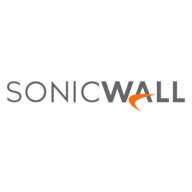


SonicWall TZ and Check Point CloudGuard Network Security compete in the network security market. Check Point CloudGuard Network Security seems to have the upper hand due to its extensive cloud compatibility and advanced threat prevention features, which are increasingly important for cloud-dependent sectors.
Features: SonicWall TZ offers ease in configuring firewall policies and site-to-site VPNs, alongside features like high availability and content filtering. These cater well to small to medium businesses looking for cost-effective security solutions. In contrast, Check Point CloudGuard Network Security offers a comprehensive suite including advanced threat prevention, centralized management, and seamless integration across hybrid environments, making it suitable for cloud-reliant businesses.
Room for Improvement: SonicWall TZ could improve its mail security and application detection while addressing user concerns about hardware and support. Additionally, its SSL inspection needs refinement for better scalability in cloud management. Check Point CloudGuard Network Security could be enhanced by simplifying its management console, reducing high resource usage for IPS, and improving technical documentation and configuration scalability for cloud environments.
Ease of Deployment and Customer Service: SonicWall TZ is noted for its straightforward deployment on-premises and manageable technical support. However, support quality can vary, with users reporting long hold times. Check Point CloudGuard Network Security supports a variety of environments but may have a more complex setup process. Despite this, its customer service is usually thorough, though often relied upon due to the need for detailed configurations.
Pricing and ROI: SonicWall TZ is seen as more cost-effective for small to medium enterprises, providing competitive pricing with scalable options. However, additional licenses and annual fees can add to costs, though ROI remains positive with immediate security benefits. Check Point CloudGuard Network Security, despite higher costs, attracts businesses with its extensive security features and flexible licensing, appealing to enterprises seeking wide-ranging security coverage. The overall value is often appreciated due to its comprehensive protection capabilities.
Clients are now comfortable and not wasting productive hours on IT support.
We have experienced a positive return on investment by utilizing Fortinet's products.
There's definitely an ROI. Having a centralized way of managing and applying policies across the entire organization always helps.
The value lies in maintaining operational integrity with zero downtime or incidents, facilitating secure, ongoing business operations.
Implementing CloudGuard has resulted in an excellent return on investment over one hundred percent ROI.
The unified policy is comprehensive and helps me to create firewall policies that are shared across all our facilities and plants.
That is a reason to buy a firewall, and it is challenging to put a monetary value on security.
He explained that it required a command line configuration, as it couldn't be done through the graphical user interface.
I would rate their support for FortiGate a nine out of ten.
They offer very accurate solutions.
They usually respond quite fast, and they are very knowledgeable about what they do.
We had an endless loop of emails trying to fix this, and the suggestion was to reinstall the gateway and do it from scratch, which was not an option at that point because it would leave that specific location without access.
Available twenty-four by seven.
Customer service is excellent.
They scale up really well from smaller models like the FortiGate 40 and 50 to bigger sites with the FortiGate 100 for more throughput - up to enterprise datacenters.
The variation comes in terms of the interfaces and throughputs, but from a security perspective, you get the same benefit, irrespective of whether you have an entry-level unit or an enterprise.
You can choose a cheaper model if you only have 20-30 users, but you will need to spend more money for a FortiGate solution that covers 5,000.
I can deploy it everywhere I need it.
We have transitioned from 1,000 to 500 users without any issue.
We perform minor and major upgrades, and it works seamlessly.
Improper handling of these can lead to a memory surge, a well-known bug that can cause the entire system to freeze.
It is less stable than Palo Alto Networks and Check Point firewalls because there are lots of bugs in the latest firmware.
We have not had any problems with the operating systems or maintenance of subscriptions.
I have not observed any downtime.
For instance, when we are working on a release and do an upgrade, we start experiencing unexpected issues.
The solution is stable.
In terms of stability, SonicWall doesn't have performance issues.
SonicWall TZ is definitely stable and offers a good value for money.
If I have put 10 GBPS of throughput on a firewall and I enable all of these features available, such as IPS or UTM functionalities, the throughput comes down to 1 GBPS.
By providing an integrated solution, users would have access to all features and functionalities within a single window, eliminating the need to navigate through multiple windows.
Investing in a solution that can accommodate such growth would be more cost-effective than repeatedly purchasing new hardware.
Scalability could be improved as well; needing to purchase a new license each time I want to add a new interface is not ideal.
Better documentation would be welcome.
The user interface could be more intuitive, and the initial setup and configuration can be complex, requiring a technical team.
Integration with other vendors, especially with VPNs, can be challenging and requires more effort when configuring.
SonicWall TZ could benefit from newer technology.
The VPN license should be improved by providing more free SSL VPN licenses.
Secure SD-WAN is free of charge.
The most expensive part is the renewal of the license subscription.
FortiGate is priced lower than Palo Alto.
The pricing and licensing are expensive, costing between seven thousand to eight thousand dollars.
Check Point is expensive, however, with the features and capabilities, I can justify the cost.
It is the highest in the market.
More licenses are required to purchase the perpetual license for SSL VPN and Global VPN.
When comparing similar products across vendors, there may be a small difference in cost.
I would also position its pricing as a three, where one is the lowest price and ten is the highest.
The firewall, IPS, and VPN functions are the most valuable features.
FortiGate provides solid protection against viruses, malware, and other threats.
Within the same dashboard, you get to see the security profiles, the type of traffic that's passing through, the top applications that are being consumed, etc.
One of the most valuable features is the automated threat prevention, which helps us detect and block potential cyberattacks in real-time, minimizing data breaches.
Centralized management is the feature I like best, resulting in reduced workload and more continuous policy.
Network Security provides us with unified security management across hybrid and cloud as well as on-prem.
For SMB segments, SonicWall performs well.
It was beneficial during COVID for remote work through its VPN functionality.
The advanced gateway security features such as web filter, application control filter, IPS, ideas, gateway antivirus, anti-spyware, and botnet filter are valuable.



Fortinet FortiGate offers comprehensive network security and firewall protection across multiple locations. It effectively manages data traffic and secures environments with features like VPN, intrusion prevention, and UTM controls.
Organizations rely on Fortinet FortiGate for its robust integration with advanced security policies, ensuring significant protection for enterprises, cloud environments, and educational sectors. It facilitates network segmentation, application-level security, and authentication management, securing communication within and between locations such as branches and data centers. Its efficient SD-WAN and UTM features enable streamlined data management and enhanced threat protection capabilities. Users appreciate its centralized management, facilitating seamless operations across diverse environments.
What are the key features of Fortinet FortiGate?
What benefits should users expect from Fortinet FortiGate?
Fortinet FortiGate is crucial in sectors like education, offering robust networks for secure data flow between campuses and facilitating remote learning. In enterprise environments, it allows efficient management of application traffic and security across multiple branches, while in the cloud, it seamlessly integrates with diverse platforms to enhance security infrastructure.
Check Point CloudGuard Network Security is designed to secure cloud assets, offering robust firewall capabilities and protection for both internal and external traffic across AWS, Azure, and on-premises environments.
Enterprises rely on Check Point CloudGuard Network Security for comprehensive network protection, threat prevention, and compliance enforcement. Supporting virtual machines and hybrid environments, it delivers advanced security measures including intrusion prevention and application control. Key functions include firewall security, network segmentation, and cloud environment protection, ensuring businesses maintain a secure and compliant IT infrastructure.
What are the most valuable features of Check Point CloudGuard Network Security?In industries such as financial services, healthcare, retail, and education, Check Point CloudGuard Network Security is implemented to safeguard sensitive data, ensure compliance, and protect critical infrastructure. Companies in these sectors benefit from its advanced threat prevention and flexible deployment options, meeting their stringent security requirements while enabling secure digital transformation.
We monitor all Firewalls reviews to prevent fraudulent reviews and keep review quality high. We do not post reviews by company employees or direct competitors. We validate each review for authenticity via cross-reference with LinkedIn, and personal follow-up with the reviewer when necessary.